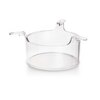The loss of tuberin promotes cell invasion through the ß-catenin pathway.
Barnes, EA; Kenerson, HL; Mak, BC; Yeung, RS
American journal of respiratory cell and molecular biology
43
617-27
2009
Afficher le résumé
Mutations in the tumor suppressor tuberin (TSC2) are a common factor in the development of lymphangioleiomyomatosis (LAM). LAM is a cystic lung disease that is characterized by the infiltration of smooth muscle-like cells into the pulmonary parenchyma. The mechanism by which the loss of tuberin promotes the development of LAM has yet to be elucidated, although several lines of evidence suggest it is due to the metastasis of tuberin-deficient cells. Here we show that tuberin-null cells become nonadherent and invasive. These nonadherent cells express cleaved forms of β-catenin. In reporter assays, the β-catenin products are transcriptionally active and promote MMP7 expression. Invasion by the tuberin-null cells is mediated by MMP7. Examination of LAM tissues shows the expression of cleaved β-catenin products and MMP7 consistent with a model that tuberin-deficient cells acquire invasive properties through a β-catenin-dependent mechanism, which may underlie the development of LAM. | 20042714
 |
Hypochlorous acid oxygenates the cysteine switch domain of pro-matrilysin (MMP-7). A mechanism for matrix metalloproteinase activation and atherosclerotic plaque rupture by myeloperoxidase.
Fu, X; Kassim, SY; Parks, WC; Heinecke, JW
The Journal of biological chemistry
276
41279-87
2001
Afficher le résumé
Myeloperoxidase uses hydrogen peroxide (H2O2) to generate hypochlorous acid (HOCl), a potent cytotoxic oxidant. We demonstrate that HOCl regulates the activity of matrix metalloproteinase-7 (MMP-7, matrilysin) in vitro, suggesting that this oxidant activates MMPs in the artery wall. Indeed, both MMP-7 and myeloperoxidase were colocalized to lipid-laden macrophages in human atherosclerotic lesions. A highly conserved domain called the cysteine switch has been proposed to regulate MMP activity. When we exposed a synthetic peptide that mimicked the cysteine switch to HOCl, HPLC analysis showed that the thiol residue reacted rapidly, generating a near-quantitative yield of products. Tandem mass spectrometric analysis identified the products as sulfinic acid, sulfonic acid, and a dimer containing a disulfide bridge. In contrast, the peptide reacted slowly with H2O2, and the only product was the disulfide. Moreover, HOCl markedly activated pro-MMP-7, an MMP expressed at high levels in lipid-laden macrophages in vivo. Tandem mass spectrometric analysis of trypsin digests revealed that the thiol residue of the enzyme's cysteine switch domain had been converted to sulfinic acid. Thiol oxidation was associated with autolytic cleavage of pro-MMP-7, strongly suggesting that oxygenation activates the latent enzyme. In contrast, H2O2 failed to oxidize the thiol residue of the protein or activate the enzyme. Thus, HOCl activates pro-MMP-7 by converting the thiol residue of the cysteine switch to sulfinic acid. This activation mechanism is distinct from the well-studied proteolytic cleavage of MMP pro-enzymes. Our observations raise the possibility that HOCl generated by myeloperoxidase contributes to MMP activation, and therefore to plaque rupture, in the artery wall. HOCl and other oxidants might regulate MMP activity by the same mechanism in a variety of inflammatory conditions. | 11533038
 |















